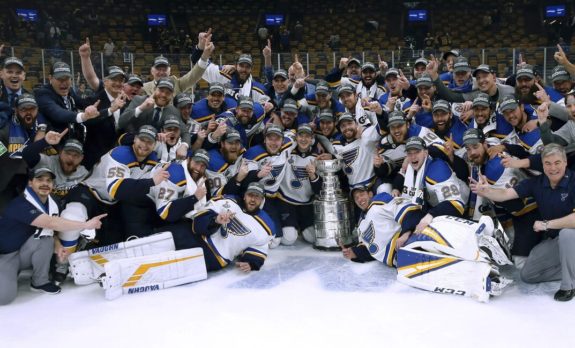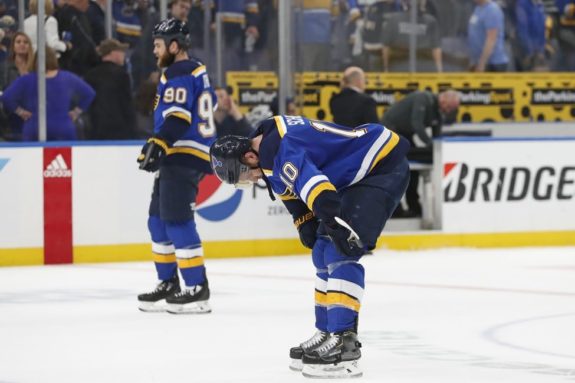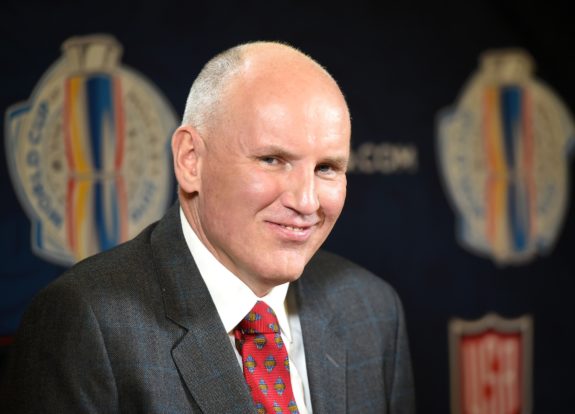The St. Louis Blues locked up another piece of their Stanley Cup Championship core Friday morning, announcing an eight-year, $52 million contract extension for Brayden Schenn.
The extension, like the one they handed Justin Faulk after acquiring him from the Carolina Hurricanes, trades a higher average annual value (AAV) for a longer-term. Schenn’s extension helps the Blues prolong their Stanley Cup window, though it may come with longterm consequences.
Home Sweet St. Louis
When the Blues traded Jori Lehtera and two first-round picks to the Philadelphia Flyers to get Schenn, it was obvious that he was a significant part of their future. David Backes and Troy Brouwer had departed the season before, and the Blues were short on physical presences and scoring threats. Schenn nicely checked both those boxes, and the trade allowed general manager Doug Armstrong to rid himself of the irksome Lehtera contract in the process.

Schenn arrived on the scene in St. Louis and fit right in, posting career numbers in his first season in town. His 70 points smashed his career-high of 59 from two seasons before, and he surpassed that season’s 26 goal mark as well, reaching 28. He found chemistry with frequent linemates Jaden Schwartz and Vladimir Tarasenko. The trio placed first, second, and third on the team in points, but it was Schenn who led the pack.
Even with their success, the Blues missed the playoffs by failing to collect a point on the final day of the regular season. Armstrong got to work and built what would become a Stanley Cup championship roster, headlined by the acquisition of Ryan O’Reilly from the Buffalo Sabres.
With O’Reilly and Tyler Bozak, whom the Blues signed as an unrestricted free agent, now in house, Schenn’s role as the unquestioned number one center was challenged. As a result, his numbers dwindled back towards his career average. He also missed some time to injury, finishing with 54 points in 72 games. He then struggled to make an impact in the playoffs, including going goalless for a 13 game stretch, finishing with just 12 points in 26 games.

That was enough, though, as other scorers stepped up and propelled the Blues to their first-ever Stanley Cup. A team that had been last in the league in early January had turned their season around and rode a wave of momentum all the way to hockey’s greatest prize. Then, it became Armstrong’s responsibility to determine what about the team was fact and what was fiction, and more importantly who and what to build around for the future.
Betting on Schenn
The Blues made one of those building blocks clear on Friday, extending Schenn on an eight-year deal. He now joins a group of only four other players in the NHL whose contracts end in the 2027-28 season, but Schenn is the oldest of that group by three years.
The Blues’ intentions are clear: they won a Stanley Cup last season, and they believe their window is now. By locking Schenn up at a lower AAV, they have more flexibility in the present, even if they live to regret the final few seasons of the contract.
It’s an understandable calculation, but several factors call their conclusion into doubt. First, the team that won the Stanley Cup last season is the same team (with the notable additions of Jordan Binnington and now Faulk as well) that was last in the league on Jan. 3 of that same season. This isn’t an unstoppable juggernaut loaded with top-tier talent like the current Tampa Bay Lightning, and while the team clearly reached the highest pinnacle in the sport, they are not now a de facto elite contender because of it.
More importantly, Schenn was a second or third-tier factor in the championship season, third in points and ninth in point share with 5.2 in the regular season, finishing seventh in scoring in the postseason. Those are fine numbers, but for a team built from the blueline, they hardly make Schenn a centerpiece of the organization. With Robert Thomas emerging as a budding star at the same time and already restricted to the wing instead of his natural position, was Schenn the right person to commit $52 million to?


Whether it was the right decision or not, it was the decision Armstrong made. He extended Schenn just ten months after he was on the verge of trading him to the Boston Bruins. The about-face is a microcosm of the Blues’ ridiculous 2019, a year that started in the basement, traveled to the mountaintop, and now has to start the journey all over again.
Short Term Success
The bottom line of the Schenn contract extension is that it is focused on the present. Armstrong believed Schenn was a central player of his championship squad and seized the opportunity to extend the player below market value thanks to a lengthier term.

The result is a stronger and more fortified team with fewer questions about its future in the short term. For Armstrong, and for the 28-year-old Schenn who will now play into St. Louis well into his mid-30s, questions about the future will have to wait their turn.